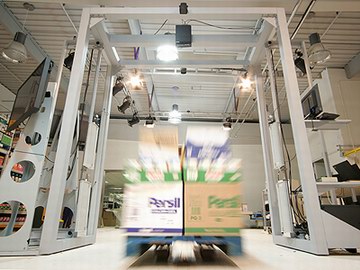At one time it was enough to just streamline operations to become more “Lean”. And those lean initiatives helped many manufacturers get through financial crises and economic downturns. Process automation and barcoding made a significant impact, but even the right mix of efficiency and business systems isn’t enough with today’s advancements. One thing is clear, the true path to the future of manufacturing competitiveness is through emerging new technologies and the adaptions of old, existing technology such as RFID.
Implementing RFID technology in the supply chain has been a topic of interest for years and many within the industry are looking once again into technology and communications like radio frequency identification. However many operational and IT teams are wary of proposing a plan to executives initiating change based on the success of a technology that has acquired such a bad reputation for being unreliable, expensive and complicated. There have been a variety of misconceptions of how RFID technology works leading manufacturers to anticipate a magical outcome, causing false hopes and disappointment.
Perpetuating these myths are multitudes of vendors and so called RFID Solution providers that hopped on the bandwagon within the last decade to get in on the RFID market selling tags and readers. Rather than educate their customers, they encourage unrealistic expectations to land the deal; ultimately leaving organizations that have invested millions in technology they believed would solve their problems with an entirely new set of issues to contend with. It’s easy to understand why RFID has gotten such a bad rap.
Truly ahead of its time, the concept of RFID preceded the sophistication of the tags, middleware and antennae required to make the solution a viable option for most organizations. Limited by the current technology, challenging environments and cost to manufacture, it has been a slow rise to the top for Radio Frequency Identification. But, cue the “Rocky” theme song, those in the RFID industry were fighters and never gave up modifying, testing and improving the technology hoping one day their time would come. Gone are the old concerns with security, investment, complicated deployments and tag reliability. Today’s RFID is no longer the “black sheep” but rather a major contender in the push for a connected supply chain and considered one of the core manufacturing technologies of the future.
Before seeking out a vendor be sure to educate yourself and your project team so you have realistic expectations of what can be achieved. Remember to evaluate all the components to a successful RFID Solution, not just tags and readers but middleware as well. Without the software you’re just scanning tags! It is absolutely critical to work with someone who is willing to fit an RFID Solution to your unique business. There is no universal RFID solution or a one-size-fits-all implementation method. With realistic goals, a committed team and knowledgeable vendor, you can trust that incorporating RFID technology into your business will not only be a viable option to help you stand out from the competition, but a successful one.

